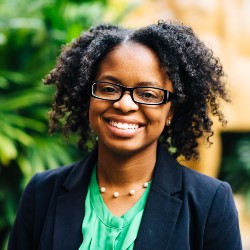
By Kimberley Clementi
We are all vulnerable to cybersecurity threats. It’s endemic to our digital era. Still, an individual’s race, gender or age could increase their susceptibility – especially in specific settings. So might a physical disability, cognitive impairment or even one’s socioeconomic status.
New UC San Diego Computer Science and Engineering (CSE) assistant teaching professor Imani Munyaka has been studying the security and privacy concerns posed by technology and has made it her goal to alleviate them for the most vulnerable populations. Munyaka, who joined the CSE this summer, is eager to continue the research she started at the University of Florida with her doctorate in Human Centered Computing.
Real-Time User Feedback
A well-published author on cybersecurity, Munyaka investigates the intersection of usability, security and privacy with applications in password protection, voting technology, banking and game design. She studies tools, or more precisely mobile device apps, to determine how the user’s experience could be improved.
Tech problems require tech solutions. That’s a given. Still, according to Munyaka, security and privacy issues are not only a tech problem; they’re a human problem. Munyaka argues that the most effective cybersecurity solutions consider the end user.
“All my research is about the human experience,” says Munyaka. “I use the word human experience because I look at usability and accessibility.”
Usability is a measure of how easy it is to use a system or tool. Accessibility is a little more nuanced. With this, Munyaka gauges cost and availability as well as inclusivity for individuals with disabilities. Looking at colors, icons, phrases, noises and vibrations, Munyaka tests variations to determine whether changes can be made to enhance the user’s experience with the app.
“People download an app and then use it for two weeks,” says Munyaka, describing real-time user testing conducted as part of her dissertation on warning design. “They give us feedback on what their experience was like.”
Munyaka contends that user feedback is indispensable. The user’s experience with the app is more critical than design likability – or even the app’s clarity and ease of use. It’s a matter of security, particularly for more vulnerable populations. This is most apparent in Munyaka’s research with the blind.
“When it comes to security and privacy tools, so much is visual. You really need to see the screen,” says Munyaka. “If I’m blind, I can’t do that.”
The blind community is not the only at-risk community to benefit from user research. Munyaka illustrates the universal importance of her work by referencing a relatable security problem for every mobile phone user: spam calls. These unwanted calls were the topic of her dissertation and the focus of her current research at UC San Diego.
According to Munyaka, the government and phone carriers are working together to develop technology to protect users from spam calls. For now, the proposed solution is a program called STIR/SHAKEN, which is a technical framework designed to validate or verify incoming calls as coming from a specific entity. The chief benefit is obvious: users receive advance warning.
Even so, STIR/SHAKEN does have limitations. As individual carriers work independently to implement a solution, inconsistencies become inherent. Additionally, design decisions are often utilitarian, failing to consider how accessible the tech solution is for the user. Munyaka’s user testing can provide valuable insights to developers.
“My work looks at how we can create warnings that will actually be useful and helpful for users when they receive that information,” says Munyaka. “I’m hoping we’ll see better warning designs, better phrases, and more consistency across carriers.”
STEM for All
Ultimately, Munyaka’s laser focus on the human experience seems to be an extension of her own value system. She believes that universities flourish best when their demographics reflect the surrounding community. This is where she hopes to have an impact at UC San Diego.
Munyaka was hired under a University of California Office of the President grant for Advancing Faculty Diversity that will help to bridge the gap between UC San Diego Black Diaspora and African American Studies and STEM. Munyaka is developing interdisciplinary courses which will not only attract minorities to STEM but will demonstrate the relevance of computer science to all fields of study.
“We’re seeing now in society that computer science, machine learning, AI, security, privacy – all of that – is embedded in everything,” says Munyaka. “It’s a lot more important now that people begin to think about [Computer Science] in any discipline.”

